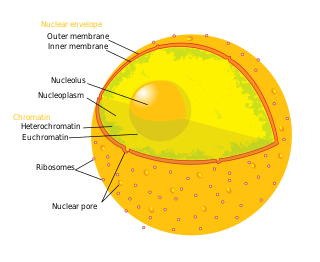
A nuclear pore is a channel as part of the nuclear pore complex (NPC), a large protein complex found in the nuclear envelope of eukaryotic cells. The nuclear envelope (NE) surrounds the cell nucleus containing DNA and facilitates the selective membrane transport of various molecules.
Importin is a type of karyopherin that transports protein molecules from the cell's cytoplasm to the nucleus. It does so by binding to specific recognition sequences, called nuclear localization sequences (NLS).

Research at the Biozentrum of the University of Basel is dedicated to the central question of how molecules and cells create life − from atom to organism, and from the physics of life to the dynamics of multicellular systems. Accordingly, the scientists at the Biozentrum are active in a wide range of research fields. These disciplines are not strictly separated from each other, but often overlap, thus leading to new questions and collaborations.
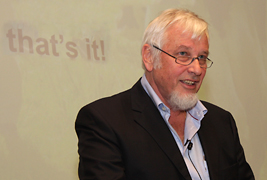
Ueli Aebi is a Swiss structural biologist and co-founder of the Maurice E. Müller Institute for Structural Biology at the Biozentrum University of Basel.

Guy R. Cornelis is a Belgian microbiologist.

Erich Nigg is a Swiss cell biologist.
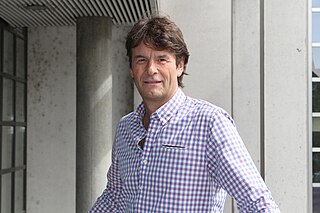
Markus Affolter is a Swiss Developmental Biologist and Professor at the Biozentrum University of Basel, Switzerland.
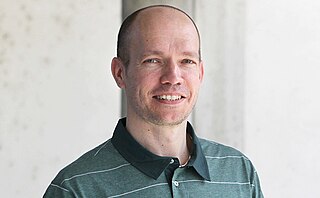
Christoph Handschin is a Swiss cell biologist at the Biozentrum University of Basel.

Martin Spiess is a Swiss Biochemist and former professor at the Biozentrum University of Basel, Switzerland.
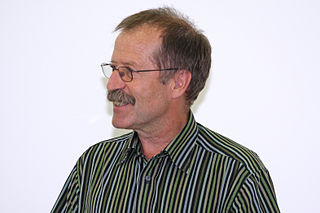
Andreas Engel is a Swiss structural biologist and co-founder of the Maurice E. Müller Institute for Structural Biology at the Biozentrum of the University of Basel.
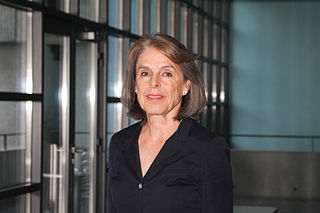
Anna Seelig-Löffler is a Swiss Biophysical chemist who worked at the Biozentrum University of Basel, Switzerland.
Ashok Venkitaraman is a British cancer researcher of Indian origin. He is the Director of the Cancer Science Institute of Singapore, a Distinguished Professor of Medicine at the National University of Singapore, and Program Director at A*STAR, Singapore. From 1998 to 2020, he was the inaugural holder of the Ursula Zoellner Professorship of Cancer Research at the University of Cambridge, a Professorial Fellow at Pembroke College, Cambridge, and from 2006 to 2019, was the Director of the Medical Research Council Cancer Unit.

Erik van Nimwegen is a Dutch computational biologist and Professor at the Biozentrum of the University of Basel, Switzerland.
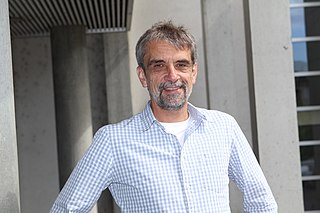
Markus Rüegg is a Swiss neurobiologist and professor at the Biozentrum of the University of Basel.
Susan Wente is an American cell biologist and academic administrator currently serving as the 14th President of Wake Forest University. From 2014 to 2021 she was Provost and Vice Chancellor for Academic Affairs at Vanderbilt University. Between August 15, 2019 and June 30, 2020, she served as interim Chancellor at Vanderbilt.
V. Nagaraja is a Professor, Department of Microbiology and Cell Biology, Indian Institute of Science, Bengaluru. He had received his B.Sc. and M.Sc. degrees in the year 1973 and 1975 from the Bangalore University. He completed his Ph.D. in 1981 from Department of Microbiology and Cell Biology at IISc and the work on mycobacteriophage I3 and role of DNA gyrase in mycobacteria set the stage for his later work when he joined the Institute as an assistant professor in 1989. After his PhD in 1981, he was a research associate at Biozentrum, University of Basel, Switzerland (1981–85) and at Department of Biology, University of Rochester, USA(1985–89). He joined in 1989 as an assistant professor, in Centre for Genetic Engineering, IISc and was involved in setting up of the department. He became an associate professor in 1995 at Department of Microbiology and Cell Biology, IISc, Professor in 2000 and served as professor and chairman of the department (2008–2013). He has been appointed president of Jawaharlal Nehru Centre for Advanced Scientific Research (JNCASR) by the Cabinet Committee on Appointments with effect from 14 October 2015.

Lim Kah Leong, is a Singaporean neuroscientist and tenured full Professor and Associate Vice President for Research at the Nanyang Technological University (Singapore), where he is also a President's Chair Professor in Translational Neuroscience. He was previously the Vice Dean for Research at the Lee Kong Chian School of Medicine at NTU, Chair of the Department of Physiology at the National University of Singapore, Singapore and the deputy director for research at the National Neuroscience Institute, Singapore. Dr. Lim is known for his research in Parkinson's Disease. His research focuses on unraveling the molecular mechanisms underlying neurodegenerative diseases, with the view to develop novel therapies aimed at effectively treating the disease.

The Adolphe Merkle Institute (AMI) is a research center in Fribourg, Switzerland focused on nanoscience. The institute is named after the Swiss entrepreneur Adolphe Merkle who created the foundation that partially funded the institute.
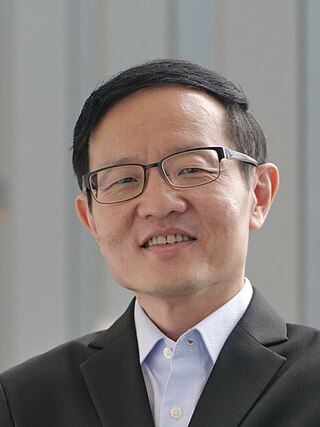
Lim Chwee Teck is a Singaporean scientist and entrepreneur. He is a specialist in human disease mechanobiology and in developing medical technologies for disease diagnosis and precision therapy and bringing them from the laboratory to the bedside.
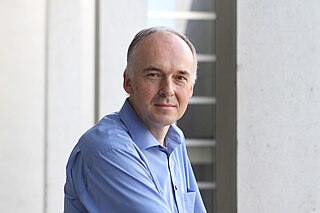
Torsten Schwede is a German and Swiss bioinformatics scientist and Professor at the Biozentrum of the University of Basel, Switzerland. He is also Vice Rector for Research at the University of Basel.
















